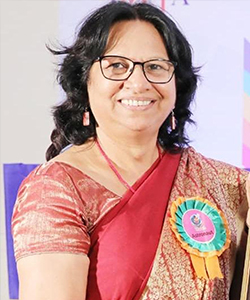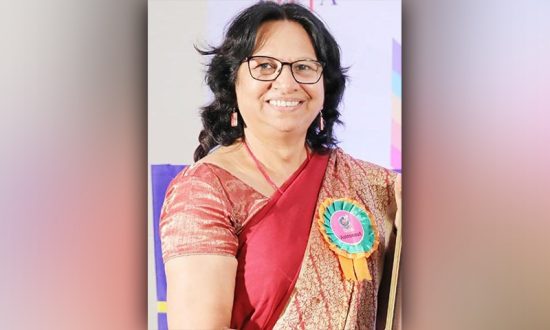Dr Reeta Sonawat is an internationally acclaimed, National Award-winning educator, especially renowned as one of the world’s top experts in the field of Early Childhood Education (ECE). Dr Sonawat has a PhD in Home Science and Child Development from Jabalpur University, besides several specialisations in ECE and childcare from international and national institutes of repute. As part of her post-doctoral research, she has worked on the project “Integrated Education in Kinder Gardens and Primary Schools” at Bremen University, Germany. She underwent a training program on Early Childhood Education with Reading Difficulties at Golda Meir Mount Carmel institute and Training Center, Haifa, Israel.
The COVID-19 pandemic has led to learning disruptions for 472 million school-going children in India, among them, 40 million belong to extremely poor families.
The new National Education Policy (NEP) has come at an opportune time with proposals in it that would go a long way in strengthening India’s education system, which has suffered serious setbacks due to the crisis. Among the most important components in the NEP is the commitment towards the Early Childhood Care and Education (ECCE) for very young children, who are at greater risk due to the pandemic.
Disruptions in early learning a serious threat
Over 85% of a child’s cumulative brain development occurs prior to the age of 6, indicating the critical importance of appropriate care and stimulation of the brain in the early years to ensure healthy brain development and growth.
Ensuring high quality and continued early education is also extremely critical for children between the ages of 0 to 8 years for the development of their physical and motor skills, cognitive, socio-emotional-ethical, cultural/artistic growth and the development of communication and early language, literacy, and numeracy.
Children in this age-group, particularly those coming from socio-economically disadvantaged backgrounds, have witnessed the worst impact of the COVID-19 crisis. Not only there have been disruptions in their learning, but the pandemic has also hampered the nutritional, healthcare and socio-emotional support which they have been getting from their schools and the early learning centres, including the government-run Anganwadis and Balwadis. These early learning centres have been providing Mid-Day meals and vaccinations and also monitoring the growth milestones of very young children from socio-economically weaker backgrounds.
Following the pandemic, the inability of poor parents to support the education of their children through alternate mediums and meet their nutritional, healthcare needs, these young children from poor backgrounds are now at a greater risk. Further, the current ECE framework was also not adequate or modern enough to support learning and other activities. Lack of
Immediate policy intervention was thus necessary not only to ensure the learning gap doesn’t widen for these children from weaker sections of the society and for preventing future dropout rates in school.
NEP’s proposal for strengthening ECE
The new education policy is a great vision to change the educational landscape in this country, and it vitalises education by ensuring that ECE becomes the starting point of education for all children. The new education policy proposes a new education structure of 5+3+3+4, brings early education within the ambit of formal education.
As special attention and priority would be given to districts and locations that are particularly socio-economically disadvantaged, learning gaps due to the pandemic can be breached with timely interventions.
The NEP has also proposed strengthening of the Anganwadis and other early learning centres to deliver ECCE at the grassroots level. This, along with the goal of a national curriculum framework for ECCE, would provide every child with the opportunity of uniform and high standards of early education in every state.
Another welcome initiative is the National Foundation of Literacy and Numeracy Mission. For attaining the goal of foundational literacy and numeracy for all children will come by 2025, the government is likely to announce various measures and increase investments to strengthen early learning.
Conclusion:
The provisions in NEP will make early education more robust, inclusive and resilient against crises like the COVID-19 pandemic.
The vision for ECE for all by 2030 is not only praiseworthy but also an achievable goal with ample cooperation from the state governments, with public-private participation models for greater capital inflows and creating a technology framework at the last mile to support the initiatives of NEP.
More About Dr Reeta Sonawat
 At Ampersand, Dr Sonawat uses her decades of experience and expertise to steer strategies for improving children’s education delivery practices pan-India, especially in public schools and state-run ECE centres. Dr Sonawat is frequently consulted by educational institutions and government bodies in India and abroad to share her opinion as well as to make crucial suggestions and observations on child education.
At Ampersand, Dr Sonawat uses her decades of experience and expertise to steer strategies for improving children’s education delivery practices pan-India, especially in public schools and state-run ECE centres. Dr Sonawat is frequently consulted by educational institutions and government bodies in India and abroad to share her opinion as well as to make crucial suggestions and observations on child education.
Dr Sonawat’s work in the field of ECE was recognised with a National Award for Teacher Trainer in innovative training for the National Council of Educational Research and Training on “Improving Classroom Environment Towards Quality in Education” in 1996. She has also been a recipient of many other prestigious awards and honours such as Research Fellowship by Shastri Indo Canadian Institute for the project titled “Adolescent of Minority Groups, Sense of belongingness to society” in 1997. Rotary Foundation Awarded Rotary Grant for University Teachers as a Rotary Ambassador of Goodwill. She was conferred with the Best Teacher Award by Governor of Maharashtra in 2012.
In the year 2005, she was recognised as a global leader in ECE by the World Forum Foundation, Montreal. In 2009, she was invited by the US State Department Bureau of Educational and Cultural Affairs, Washington DC, for an overview of the US education system and federal leadership under its International visitor leadership program on Early Childhood Education. She was also invited by innovative Charters Schools and Magnet Schools, George Washington University, Rutgers University, Arizona State University, and the University of Arkansas to share her expertise. She was invited as a speaker and International trainer in Athens, Brasilia, Montreal, Jogja, Jakarta, Kuala Lumpur, Reggio Emilia, London, Belfast, Manila, Auckland, Honolulu, Nairobi, Malindi, Kasese, Kamouli and Baku. Dr Sonawat has been a Visiting Professor at the Atma Jaya Jogjyakarta University, Indonesia.
Dr Sonawat is the former Dean and Professor and Head, Department of Human Development at SNDT Women’s University. Before Ampersand, she held the position of Director, Early Childhood Education, HUBBLE, Innovations at SNDT Women’s University.
Besides being an educator, Dr Sonawat is also a prolific writer – she has so far authored more than 14 books related to her area of work.




